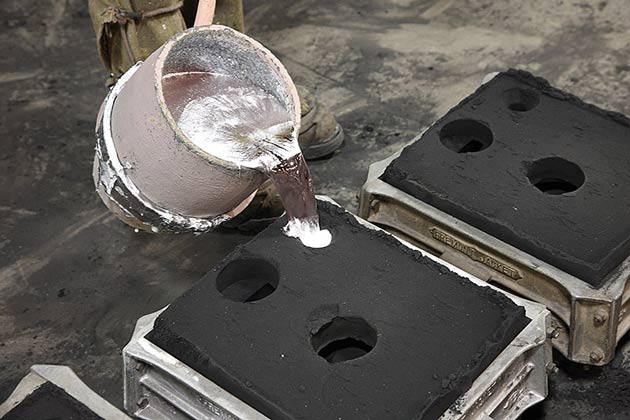All About Alcast Company
Table of ContentsWhat Does Alcast Company Do?The Buzz on Alcast CompanyAn Unbiased View of Alcast CompanyAbout Alcast Company6 Simple Techniques For Alcast CompanyThe Ultimate Guide To Alcast Company
The subtle difference hinges on the chemical web content. Chemical Contrast of Cast Aluminum Alloys Silicon promotes castability by decreasing the alloy's melting temperature level and boosting fluidness throughout spreading. It plays an important duty in permitting intricate molds to be filled up properly. Furthermore, silicon adds to the alloy's strength and wear resistance, making it beneficial in applications where resilience is critical, such as vehicle parts and engine components.It additionally improves the machinability of the alloy, making it simpler to process right into finished items. In this method, iron contributes to the total workability of aluminum alloys.
Manganese contributes to the toughness of aluminum alloys and enhances workability. Magnesium is a light-weight aspect that provides stamina and influence resistance to aluminum alloys.
Alcast Company Fundamentals Explained
Zinc boosts the castability of aluminum alloys and aids regulate the solidification procedure throughout spreading. It boosts the alloy's toughness and solidity.

The primary thermal conductivity, tensile strength, return toughness, and prolongation vary. Amongst the above alloys, A356 has the greatest thermal conductivity, and A380 and ADC12 have the least expensive.
Alcast Company Things To Know Before You Buy

In precision casting, 6063 is fit for applications where elaborate geometries and high-quality surface area coatings are critical. Instances consist of telecommunication enclosures, where the alloy's remarkable formability permits for sleek and visually pleasing layouts while keeping structural integrity. In the Lights Solutions sector, precision-cast 6063 components create elegant and effective illumination components that need detailed forms and excellent thermal efficiency.
The A360 shows remarkable elongation, making it optimal for complicated and thin-walled components. In accuracy casting applications, A360 is well-suited for industries such as Consumer Electronic Devices, Telecommunication, and Power Tools.
Alcast Company for Dummies
Its one-of-a-kind residential or commercial properties make A360 a useful selection for accuracy spreading in these sectors, enhancing product toughness and top quality. Casting Foundry. Aluminum alloy 380, or A380, is a widely utilized casting alloy with a number of unique attributes.
In accuracy casting, aluminum 413 shines in the Consumer Electronics and Power Equipment markets. It's typically utilized to craft elaborate components like smartphone real estates, electronic camera bodies, and power device cases. Its precision is amazing, with tight resistances approximately 0.01 mm, making sure perfect product assembly. This alloy's premium deterioration resistance makes it a superb option for outdoor applications, ensuring lasting, sturdy items in the discussed industries.
All about Alcast Company
The light weight aluminum alloy you pick will substantially impact both the casting process and the residential properties of the last item. Because of this, you should make your decision very carefully and take an enlightened strategy.
Establishing one of the most ideal light weight aluminum alloy for your application will certainly suggest considering a broad selection of attributes. These comparative alloy qualities adhere to the North American Pass Away Casting Organization's standards, and we've divided them into two groups. The initial group addresses alloy features that influence the production process. The second covers characteristics affecting the residential or commercial properties of the end product.
The Only Guide for Alcast Company
The alloy you choose for die spreading directly impacts several elements of the spreading process, like just how easy the alloy is to collaborate with and if it is prone to casting flaws. Hot splitting, also referred to as solidification cracking, is a normal die spreading problem for light weight aluminum alloys that can result in internal or surface-level tears or fractures.
Certain aluminum alloys are much more prone to warm fracturing than others, and your selection ought to consider this. It can damage both the cast and the die, so you must why not try here look for alloys with high anti-soldering buildings.
Corrosion resistance, which is already a noteworthy quality of light weight aluminum, can differ considerably from alloy to alloy and is an important characteristic to think about depending upon the environmental conditions your product will be subjected to (Foundry). Wear resistance is another building commonly looked for in light weight aluminum items and can separate some alloys